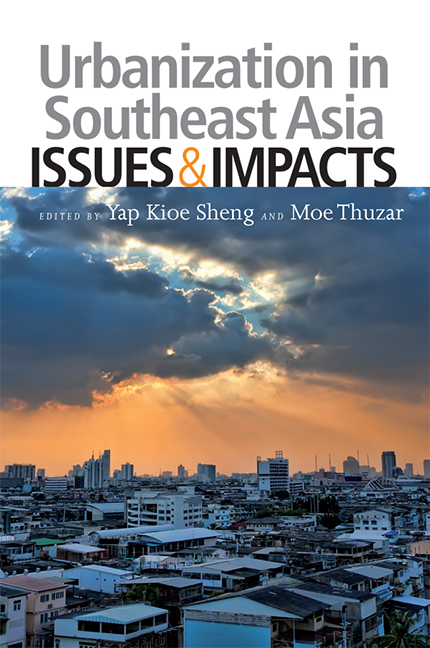Book contents
- Frontmatter
- Contents
- Message from Head, ASEAN Studies Centre
- Message from Director, Centre for Liveable Cities
- About the Contributors
- Introduction
- Urbanization in Southeast Asian Countries: Recommendations
- 1 The Challenges of Promoting Productive, Inclusive and Sustainable Urbanization
- Cities as Engines of Development
- Inclusive Cities
- Cities and the Environment
- Governance, Decentralization, and Urbanization
- Urbanization from an ASEAN Perspective
- Index
Urbanization in Southeast Asian Countries: Recommendations
Published online by Cambridge University Press: 21 October 2015
- Frontmatter
- Contents
- Message from Head, ASEAN Studies Centre
- Message from Director, Centre for Liveable Cities
- About the Contributors
- Introduction
- Urbanization in Southeast Asian Countries: Recommendations
- 1 The Challenges of Promoting Productive, Inclusive and Sustainable Urbanization
- Cities as Engines of Development
- Inclusive Cities
- Cities and the Environment
- Governance, Decentralization, and Urbanization
- Urbanization from an ASEAN Perspective
- Index
Summary
Southeast Asia is urbanizing and the challenges emanating from the urbanization are numerous and complex. The ASEAN Studies Centre (ASC) and the Centre for Liveable Cities (CLC) jointly organized three workshops in December 2009 and March and July 2010 in Singapore to discuss these challenges on the basis of a regional overview paper and a number of other topical papers. Based on the overview paper, the thematic papers, and discussions by participants in the workshops, the following recommendations were formulated for ASEAN's consideration.
NETWORKING
1. ASEAN currently does not have a formal network of researchers on urbanization in Southeast Asia. With the CLC-ASC regional workshops as the starting point, ASEAN can develop a network of urban researchers and practitioners in the ASEAN member states, leading towards the establishment of a network of experts on urbanization in Southeast Asia.
2. Most countries of ASEAN have an association or league of municipalities in one form or another. These associations/leagues can be formed into a regional federation of associations/leagues of municipalities to facilitate cooperation, the exchange of information and experiences, and their capacity development.
3. Networking can be further enhanced through regular annual round tables which bring together urban researchers, policymakers and the private sector, with the aim of developing recommendations for more responsive policies to address the challenges of urbanization in Southeast Asia, for consideration by ASEAN decision-makers.
DEVELOPING MORE RESPONSIVE POLICIES
4. Urban-specific data are required to formulate effective policies on critical urban issues, especially data on the impact on urbanization and urban settlements of increased connectivity and economic integration in the region. Building on the CLC-ASC regional workshop series. ASEAN can further develop a series of workshops for policymakers, statistical offices, and researchers from member states to discuss the collection and use of urban-specific data.
5. Economic globalization, decentralization, privatization, and climate change mitigation and adaptation are largely uncharted territory for cities and towns in Southeast Asia. It is timely for ASEAN to commission a series of studies on good practices in urban development under these conditions.
INCREASING CAPACITY
6. Many local governments lack the capacity to make use of the opportunities offered by decentralization, privatization and economic globalization, and to deal with climate change. This hampers the development of cities and towns.
- Type
- Chapter
- Information
- Urbanization in Southeast AsiaIssues and Impacts, pp. 8 - 9Publisher: ISEAS–Yusof Ishak InstitutePrint publication year: 2012

